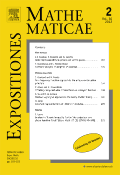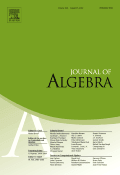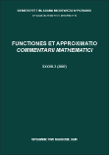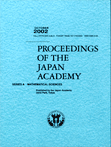
ACTA ARITHMETICA
Scope & Guideline
Unveiling new horizons in mathematical research.
Introduction
Aims and Scopes
- Diophantine Equations and Approximations:
The journal frequently publishes work related to diophantine equations, focusing on their solutions, properties, and approximations. This includes studies on the distribution of solutions and their relationships with prime numbers. - Modular Forms and L-functions:
A significant portion of the research covers modular forms and their associated L-functions, examining their properties, congruences, and applications in number theory. - Algebraic Number Theory:
The journal emphasizes research in algebraic number theory, exploring topics such as class groups, Galois theory, and the properties of number fields. - Analytic Number Theory:
ACTA ARITHMETICA publishes articles addressing problems in analytic number theory, including the distribution of prime numbers, zeta functions, and asymptotic results. - Arithmetic Geometry and Algebraic Geometry:
Research involving arithmetic geometry is a core focus, particularly studies that link algebraic geometry with number theory, such as the analysis of rational points on varieties. - Additive and Multiplicative Number Theory:
The journal includes works that delve into additive and multiplicative properties of integers, including partition theory and the behavior of arithmetic functions.
Trending and Emerging
- Analytic Techniques in Number Theory:
There is a growing trend towards using analytic methods to address classical problems in number theory, such as those involving the distribution of primes and values of L-functions. - Interplay Between Number Theory and Geometry:
Emerging research increasingly explores the connections between number theory and geometry, particularly in the context of arithmetic geometry and the study of rational points on algebraic varieties. - Computational Number Theory:
With advancements in computational techniques, there is a noticeable increase in publications focused on algorithmic approaches to number-theoretic problems, including those involving large datasets and computational proofs. - Higher-Dimensional Number Theory:
Research exploring number-theoretic problems in higher dimensions, such as higher-rank algebraic structures and their properties, is becoming more prevalent. - Randomness and Distribution in Number Theory:
Themes related to the randomness in number theory, including probabilistic methods and statistical distributions of arithmetic functions, are increasingly featured in the journal.
Declining or Waning
- Elementary Number Theory:
Research that primarily focuses on elementary techniques in number theory seems to be waning. The journal has shifted towards more advanced topics requiring deeper analytical methods and algebraic structures. - Combinatorial Number Theory:
The scope of combinatorial number theory, which traditionally included topics like partitions and additive combinatorics, appears to be less represented in recent publications. - Classical Approaches to Number Theory:
There is a noticeable decline in classical approaches to number theory, such as those focusing solely on integer sequences or simple congruences, as more complex and abstract methodologies gain favor. - Elementary Methods in Diophantine Analysis:
The use of elementary methods in tackling Diophantine problems, while still relevant, is becoming less frequent as the journal emphasizes more sophisticated techniques and computational approaches.
Similar Journals

EXPOSITIONES MATHEMATICAE
Connecting Scholars Through Mathematical InsightsEXPOSITIONES MATHEMATICAE, published by Elsevier GmbH, stands as a significant journal in the realm of mathematics, catering primarily to researchers, professionals, and students. With an ISSN of 0723-0869 and an E-ISSN of 1878-0792, this journal has made its mark in the academic community, boasting a Q2 classification in the miscellaneous mathematics category for 2023, illustrating its prominence within its field. The journal addresses a diverse scope of mathematical topics, encouraging the publication of original research and innovative theories while maintaining rigorous academic standards. As it converges from 2004 to 2024, EXPOSITIONES MATHEMATICAE continues to be an essential resource for advancing mathematical knowledge and fostering scholarly communication, despite being a non-open-access publication. Its location in Munich, Germany further anchors it within a rich intellectual tradition, providing accessibility for the mathematical community worldwide.

PUBLICATIONES MATHEMATICAE DEBRECEN
Advancing Mathematical Frontiers with Rigorous ResearchPublicationes Mathematicae Debrecen is a renowned international journal published by the University of Debrecen, Institute of Mathematics, situated in Hungary. This journal, with both ISSN 0033-3883 and E-ISSN 2064-2849, has established itself in the field of mathematics since its inception, with coverage extending from 1997 to 2024. Recognized for its rigorous academic standards, it currently holds a Q3 ranking in the mathematics (miscellaneous) category for 2023 and ranks at the 42nd percentile among general mathematics journals in Scopus. Publicationes Mathematicae Debrecen aims to disseminate high-quality research across various areas of mathematics, contributing to the advancement of knowledge and practice in this dynamic field. Although it is not an open-access journal, its readers can access a wealth of scholarly work that addresses both theoretical and applied mathematical issues, making it an invaluable resource for researchers, professionals, and students alike.

JP Journal of Algebra Number Theory and Applications
Charting New Territories in Algebra and Number TheoryJP Journal of Algebra Number Theory and Applications is a distinguished publication within the field of mathematics, specifically focusing on algebra and number theory. Published by PUSHPA PUBLISHING HOUSE, this journal serves as a platform for researchers and professionals to disseminate their cutting-edge findings and innovative methodologies. With its ISSN 0972-5555, it caters to an audience eager to explore mathematical concepts and applications that impact various scientific domains. Although it operates on a subscription model, the journal's commitment to high-quality peer-reviewed content makes it a valuable resource for students and scholars alike. The journal offers an exclusive insight into the complex interplay between algebra and number theory, ensuring that it remains at the forefront of mathematical discourse despite its coverage discontinuation from Scopus. The absence of an H-Index and low rankings within Scopus underscore the challenges the journal faces in a competitive academic landscape; however, it continues to foster a community for the exchange of ideas and the advancement of knowledge in mathematics.

Forum of Mathematics Sigma
Shaping the future of mathematics through rigorous scholarship.Forum of Mathematics Sigma is a premier open access journal published by Cambridge University Press that has been at the forefront of mathematical research since its inception in 2013. With a strong emphasis on advancing the fields of mathematics, the journal consistently achieves Q1 rankings across multiple categories, including Algebra and Number Theory, Analysis, and Computational Mathematics. This distinction highlights its impact and relevance within the scholarly community. The journal prides itself on providing a platform for innovative research, fostering collaboration among researchers and practitioners across various mathematical disciplines. Open access publication ensures that cutting-edge findings are widely available to readers globally, enhancing the dissemination of knowledge. With an address in the heart of Cambridge, England, Forum of Mathematics Sigma is dedicated to promoting high-quality research and making significant contributions to the development of mathematics.

Periodica Mathematica Hungarica
Unveiling the Depths of Mathematical Knowledge.Periodica Mathematica Hungarica is a prestigious academic journal published by Springer, focusing on the field of mathematics, with a particular emphasis on miscellaneous mathematical studies. Established in 1971, this journal has maintained its commitment to advancing mathematical research and its applications, making significant contributions over its converged years through 2024. With a Q2 ranking in the mathematics category as of 2023, it establishes itself as a vital resource within the mathematical community. Researchers and academics will find its inclusion in the Scopus database, ranking #189 out of 399 in general mathematics, indicative of its impact and relevance. Although it does not feature open access, the journal provides a wealth of high-quality peer-reviewed articles, thereby serving as an essential platform for the dissemination of innovative mathematical theories, methodologies, and findings. Engaging with the content of Periodica Mathematica Hungarica is crucial for anyone looking to stay at the forefront of mathematical research and development.

JOURNAL OF ALGEBRA
Connecting Scholars Through Algebraic InsightsThe JOURNAL OF ALGEBRA, published by Academic Press Inc. Elsevier Science, is a premier scholarly outlet dedicated to the field of algebra and number theory. With its impressive Q1 ranking in the 2023 category of Algebra and Number Theory and a solid Scopus rank of #46 out of 119, it stands as a crucial resource for researchers and professionals seeking to deepen their understanding of advanced algebraic concepts. Operating since 1964 and continuing through 2025, the journal boasts a rich history of publishing influential research that drives the discipline forward. While the journal does not currently offer open access options, it remains committed to providing high-quality peer-reviewed content to the academic community. Its comprehensive archive and cutting-edge research articles serve as essential tools for students, researchers, and practitioners aiming to stay at the forefront of algebraic studies.

ANNALES DE L INSTITUT FOURIER
Advancing Mathematical FrontiersANNALES DE L INSTITUT FOURIER is a premier academic journal published by ANNALES INST FOURIER, specializing in the fields of Algebra and Number Theory as well as Geometry and Topology. Since its establishment, the journal has garnered a distinguished reputation, evidenced by its Q1 quartile ranking in the 2023 category assessments and its Scopus Rank of #37 out of 119 in Algebra and Number Theory, and #34 out of 106 in Geometry and Topology, placing it within the top percentile of its field. The journal serves as a vital platform for disseminating groundbreaking research and innovative methodologies, catering to a global audience of researchers, professionals, and students. With a commitment to the advancement of mathematical sciences, ANNALES DE L INSTITUT FOURIER invites contributions that push the boundaries of knowledge and foster collaboration across disciplines. Although it does not offer open access, the rigorous peer-review process ensures that published papers meet the highest academic standards, making it a critical resource for anyone engaged in advanced mathematical research.

RAMANUJAN JOURNAL
Connecting scholars through mathematical excellence.The Ramanujan Journal, published by Springer, is a premier academic journal dedicated to advancing research in the fields of Algebra and Number Theory. With an ISSN of 1382-4090 and an E-ISSN of 1572-9303, this journal has established itself as a vital platform for disseminating high-quality research from 1997 through 2024. The 2023 category quartiles rank it in Q1 for Algebra and Number Theory, reflecting its rigorous selection standards and significant impact in the mathematics community, evidenced by its Scopus rank of 53 out of 119 in its category. Although it does not currently offer open access, the journal is pivotal for researchers and professionals seeking to engage with cutting-edge advancements and comprehensive studies in these mathematical disciplines. The Ramanujan Journal represents a critical resource for students and scholars alike, fostering a deeper understanding and innovative exploration of algebraic and number-theoretical concepts.

FUNCTIONES ET APPROXIMATIO COMMENTARII MATHEMATICI
Bridging Theory and Application in MathematicsFUNCTIONES ET APPROXIMATIO COMMENTARII MATHEMATICI is an esteemed academic journal published by WYDAWNICTWO NAUKOWE UAM, based in Poznań, Poland. With a focus on a diverse array of topics within the field of mathematics, this journal plays a vital role in disseminating innovative research and fostering collaboration among mathematicians and scholars worldwide. As of 2023, it holds a respectable Q3 rank in the miscellaneous mathematics category, indicating its relevance and contribution to the broader mathematical community. While the journal currently operates without open access options, its commitment to quality research is reflected in its rigorous editorial standards and a broad scope of articles spanning theoretical advancements to practical applications. Researchers and practitioners alike will find this journal to be an invaluable resource for cutting-edge mathematical discourse, contributing to its convergence years from 2006 to 2024. For those seeking to enhance their knowledge and engage with pioneering work in mathematics, FUNCTIONES ET APPROXIMATIO COMMENTARII MATHEMATICI stands out as a noteworthy publication.

PROCEEDINGS OF THE JAPAN ACADEMY SERIES A-MATHEMATICAL SCIENCES
A Premier Resource for Mathematical Breakthroughs.PROCEEDINGS OF THE JAPAN ACADEMY SERIES A-MATHEMATICAL SCIENCES, published by the JAPAN ACADEMY, serves as a premier platform for disseminating original research in the field of mathematical sciences. Based in Japan, this journal has been a vital contributor to the global mathematical community since its inception, with continuous publication from 1996 to 2024. While it currently holds a Q3 ranking in the miscellaneous mathematics category according to the 2023 category quartiles, it provides an invaluable repository of knowledge that facilitates advancements in various mathematical disciplines. Although it is not an open-access journal, it remains widely regarded for its rigorous peer-review process, ensuring that high-quality research is presented to its audience. The journal is essential for researchers, professionals, and students eager to stay informed about novel developments and trends in mathematics. With an ISSN of 0386-2194, it aspires to foster collaboration and innovation within the mathematical sciences.